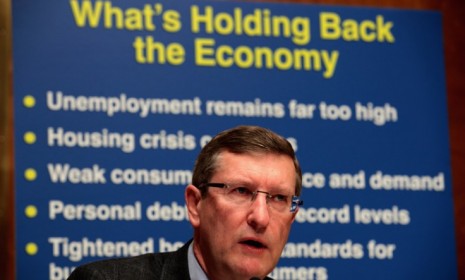Is D.C.'s deficit obsession undermining the economic recovery?
A new report forecasts sky-high deficits for years without immediate, tough cuts — but alternative approaches are just as troubling

A free daily email with the biggest news stories of the day – and the best features from TheWeek.com
You are now subscribed
Your newsletter sign-up was successful
The non-partisan Congressional Budget Office released some sobering figures on Tuesday, forecasting deficits hovering near $1 trillion a year until 2017 unless Congress makes good on vows to slash spending and raise new revenue. But the flip side of the prediction is also troubling: If Washington takes such prudent measures — allowing the Bush era tax cuts to expire and going through with spending cuts under last summer's deal to raise the debt ceiling — economic growth will be significantly slower next year. Will Congress' deficit-cutting fever slow down the recovery?
Yes, cutting back now hurts the economy: This is the great "irony of Washington's laser-like focus on the deficit," says Sahil Kapur at Talking Points Memo. Letting the Bush tax cuts fade away and going through with the cuts prescribed by the August debt deal shaves $2.4 trillion from the next decade's deficits. However, if Congress forgoes such austerity measures, GDP growth would increase by up to 2.9 percent next year. Washington's brand of fiscal responsibility has "held back rather than helped the economy."
"Chart: How deficit cuts are about to hurt the economy"
The Week
Escape your echo chamber. Get the facts behind the news, plus analysis from multiple perspectives.

Sign up for The Week's Free Newsletters
From our morning news briefing to a weekly Good News Newsletter, get the best of The Week delivered directly to your inbox.
From our morning news briefing to a weekly Good News Newsletter, get the best of The Week delivered directly to your inbox.
The looming tax hike is the problem: The really disturbing projection from the CBO, says Dave Carter at Gateway Pundit, is that "the amount of money that the federal government will suck out of the private sector will increase by more than 30 percent between now and 2014," thanks to expiring tax relief and new taxes, fees, and penalties set to take effect — "a euphemistic description of Obamacare." In other words, President Obama is "pushing the economy over a cliff."
The point is that only tough reform will avert calamity: Don't waste time gabbing about all those tax hikes hitting at once, says Peter Suderman at Reason. Sure, that's what's written into current law, but "there's simply no plausible near-future political environment in which this happens." Here's the bottom line: The government is spending 23.2 percent of our total economic output, and history says it can't collect the equivalent of that in revenue without killing the economy. So eventually, without tough reform, we face a "Budgepocalypse."
"Budgepocalypse 2012: Revenge of the Budgepocalypse"
A free daily email with the biggest news stories of the day – and the best features from TheWeek.com
-
 The Olympic timekeepers keeping the Games on track
The Olympic timekeepers keeping the Games on trackUnder the Radar Swiss watchmaking giant Omega has been at the finish line of every Olympic Games for nearly 100 years
-
 Will increasing tensions with Iran boil over into war?
Will increasing tensions with Iran boil over into war?Today’s Big Question President Donald Trump has recently been threatening the country
-
 Corruption: The spy sheikh and the president
Corruption: The spy sheikh and the presidentFeature Trump is at the center of another scandal